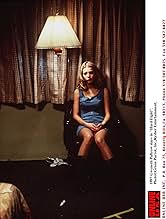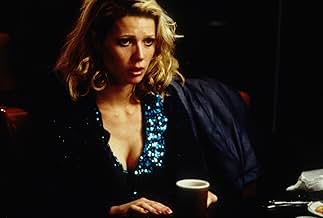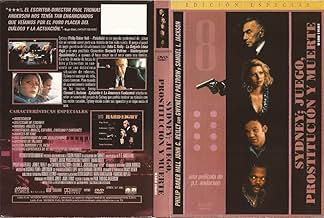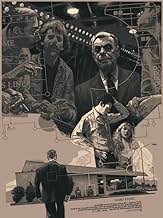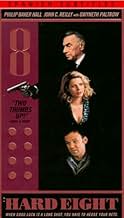- Awards
- 2 wins & 8 nominations total
Philip Seymour Hoffman
- Young Craps Player
- (as Phillip Seymour Hoffman)
- Director
- Writer
- All cast & crew
- Production, box office & more at IMDbPro
Featured reviews
This first film from Paul Thomas Anderson shows the promise he would later fulfill with BOOGIE NIGHTS. The writing here is as sharp as it was in the later film, but it must be said as a director, he sometimes lets scenes go on too long (ironic that BOOGIE NIGHTS, which is a longer film, is also a tighter one). The main connection between both films is Anderson's obvious affection for his characters. Also the relationship between Sydney and John doesn't turn out the way you'd expect. And Anderson is to be commended for avoiding melodrama.
Philip Baker Hall is one of those actors who you may not know by name, but when you see him you instinctively feel he's right for the part, no matter how small. This is one of his rare leading roles, and he's perfect, showing the character's success and also his loneliness, without sentimentalizing it. John C. Reilly is properly eager and naive as John. Samuel L. Jackson is dependable here, and Gwyneth Paltrow proves she doesn't need a British accent to give a good performance. She and Jackson should also be commended for backing Anderson when he had problems with the studio.
Philip Baker Hall is one of those actors who you may not know by name, but when you see him you instinctively feel he's right for the part, no matter how small. This is one of his rare leading roles, and he's perfect, showing the character's success and also his loneliness, without sentimentalizing it. John C. Reilly is properly eager and naive as John. Samuel L. Jackson is dependable here, and Gwyneth Paltrow proves she doesn't need a British accent to give a good performance. She and Jackson should also be commended for backing Anderson when he had problems with the studio.
Sydney is an old gambler who shows kindness to a man he meets outside a diner. He helps out John by lending him £50 and then teaching him enough about gambling to make his way. Two years later finds John loyally sticking with John and adoring him. However, their relationship is put under pressure when John hooks up with Clementine, a cocktail waitress who also turns tricks and Jimmy, a low life with no respect for Sydney.
Although it was pretty badly treated in the UK and mostly ignored and overlooked, the success of Anderson's films since has given many a reason to look back on Hard Eight (the much better but less meaningful title given it for the UK release) and `discover' it. It certainly is an impressive film and it is difficult to see why it received neither financial or critic success when it was released. The plot is deceptive - starting as a character piece, changing violently with a series of twists and then reverting back to the character piece we started with.
The film is totally driven by it's characters and they are very well written to the point that we care about them even before we really know all about them. The title `Sydney' is more meaningful simply because the film is pretty much all about Sydney himself. He is a kind man and we wonder why but are gradually won over his gentle nature. This makes the second half of the film more thrilling simply because we think we know Sydney but then he has to do things we think are not in him. Anderson directs with a remarkable assurance; he has style and a real sense of framing. He mixes close ups with wider shots using the fluorescent lighting of the gambling joints to good effect - his direction is as good here as it was in his other, more acclaimed films.
The main thing that makes this film so good though, is the cast. Hall is excellent; I cannot stress how good he is here - his character is well written but it is Hall that makes it work so well with a performance that is subtle and controlled. Reilly is a great character actor and he does the same here with a hangdog expression and put upon attitude. Paltrow is very good for someone whom people seem to have forgotten can actually act. Her Clementine is more complex that first appears. However despite her good work, I think that Paltrow's limited screen time actually helps the film - she is not the focus here. Jackson is his usual cool self and turns in a memorable performance while Anderson even has a part for Hoffman.
I can imagine some people will not like this film: it is talky for long sections and it ends with questions to be answered - this may frustrate some people but for me I felt it allowed me to think for myself and use what I had learnt about Sydney. This is a surprisingly mature film from such a young director and one that you owe it to yourself to undercover in retrospect.
Although it was pretty badly treated in the UK and mostly ignored and overlooked, the success of Anderson's films since has given many a reason to look back on Hard Eight (the much better but less meaningful title given it for the UK release) and `discover' it. It certainly is an impressive film and it is difficult to see why it received neither financial or critic success when it was released. The plot is deceptive - starting as a character piece, changing violently with a series of twists and then reverting back to the character piece we started with.
The film is totally driven by it's characters and they are very well written to the point that we care about them even before we really know all about them. The title `Sydney' is more meaningful simply because the film is pretty much all about Sydney himself. He is a kind man and we wonder why but are gradually won over his gentle nature. This makes the second half of the film more thrilling simply because we think we know Sydney but then he has to do things we think are not in him. Anderson directs with a remarkable assurance; he has style and a real sense of framing. He mixes close ups with wider shots using the fluorescent lighting of the gambling joints to good effect - his direction is as good here as it was in his other, more acclaimed films.
The main thing that makes this film so good though, is the cast. Hall is excellent; I cannot stress how good he is here - his character is well written but it is Hall that makes it work so well with a performance that is subtle and controlled. Reilly is a great character actor and he does the same here with a hangdog expression and put upon attitude. Paltrow is very good for someone whom people seem to have forgotten can actually act. Her Clementine is more complex that first appears. However despite her good work, I think that Paltrow's limited screen time actually helps the film - she is not the focus here. Jackson is his usual cool self and turns in a memorable performance while Anderson even has a part for Hoffman.
I can imagine some people will not like this film: it is talky for long sections and it ends with questions to be answered - this may frustrate some people but for me I felt it allowed me to think for myself and use what I had learnt about Sydney. This is a surprisingly mature film from such a young director and one that you owe it to yourself to undercover in retrospect.
10nout
Excellent movie. Excellent actors. I like the calm flow of the movie. Dialogs are strong: very realistic, not cultivated in a predictable and
understandable main stream drama form. The hostage scene is brilliant. In many movies the characters
react in a movie-like way, shaped in how the characters would
react if...too cultivated, mostly showcases for actors to show how
emotional and brilliant they can play their roles. In this movie the characters many times don't know what to say or
how to react and that's brilliant in my opinion. In real life you don't have strong and powerful one-liners at hand. But still it is a movie and put into a form, a calm and understated,
but brilliant form.
understandable main stream drama form. The hostage scene is brilliant. In many movies the characters
react in a movie-like way, shaped in how the characters would
react if...too cultivated, mostly showcases for actors to show how
emotional and brilliant they can play their roles. In this movie the characters many times don't know what to say or
how to react and that's brilliant in my opinion. In real life you don't have strong and powerful one-liners at hand. But still it is a movie and put into a form, a calm and understated,
but brilliant form.
Philip Baker Hall's Sidney kept me riveted from the first scene to the last. He play the mesmerizing, enigmatic title character with rare mastery and grace. The supporting characters are no slouches either. John C. Reilly is marvelous as Sidney's sweet, if somewhat slow witted protege. Samuel Jackson could have easily coasted on this one, simply repeating a performance from any of a number of previous tough guy types. Instead he creates an entirely new character, one with a reptilian quality not seen in his usual thugs. Even Gwenyth Paltrow is unusually strong as Clem, the waitress who wants it understood that, even if she sometimes sleeps with men for money, she is definitely NOT a prostitute.
I've been a fan of PT Anderson for a while now, and this film gave me new insight into why it is I like him so much. Anderson is that great rarity in modern filmmaking, an actor's director. He gathers terrific actors and inspires them to career-topping performances. There's no fiendishly complex plot here, no nailbiting suspense, no big payoff at the end. Just marvelous actors making the most of an excellent script.
I've been a fan of PT Anderson for a while now, and this film gave me new insight into why it is I like him so much. Anderson is that great rarity in modern filmmaking, an actor's director. He gathers terrific actors and inspires them to career-topping performances. There's no fiendishly complex plot here, no nailbiting suspense, no big payoff at the end. Just marvelous actors making the most of an excellent script.
Most people didn't catch this movie when it was released (in the cinema or on video), but did discover Paul Thomas Anderson's work with the phenomenal "Boogie Nights." Make no mistake: this film is every bit as good, perhaps better, than "Boogie." It's a small film whereas "Boogie" is a huge film, but it's packed with outstanding performances (many from actors and actresses who would go on to appear in "Boogie"), a great script (and a tighter story than "Boogie"), and the same fantastic direction. Everyone who loved "Boogie," and even those who didn't, should go back and rent this film. A very stylish, moody drama/mystery.
Did you know
- TriviaAccording to Philip Baker Hall, Philip Seymour Hoffman improvised his scenes, including most of the craps scene.
- GoofsAt 30: The craps table that Sydney walks by shows players cheering, but the cover (lid) and count slip are on top. If it were a real game there would be no cover.
- How long is Hard Eight?Powered by Alexa
Details
Box office
- Budget
- $3,000,000 (estimated)
- Gross US & Canada
- $222,559
- Opening weekend US & Canada
- $69,486
- Mar 2, 1997
- Gross worldwide
- $224,126
- Runtime
- 1h 42m(102 min)
- Color
- Sound mix
- Aspect ratio
- 2.39 : 1
Contribute to this page
Suggest an edit or add missing content



